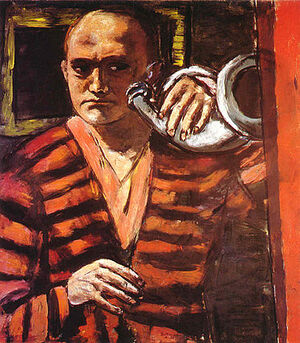Max Beckmann (nonfiction): Difference between revisions
No edit summary |
|||
| Line 15: | Line 15: | ||
== In the News == | == In the News == | ||
<gallery | <gallery> | ||
File:Carnival Max-Beckmann.jpg|link=Max Beckmann|Working undercover, [[Max Beckmann|Beckmann]] busts [[Transit drug]] ring in ''Carnival'' (1943). | File:Carnival Max-Beckmann.jpg|link=Max Beckmann|Working undercover, [[Max Beckmann|Beckmann]] busts [[Transit drug]] ring in ''Carnival'' (1943). | ||
</gallery> | </gallery> | ||
| Line 31: | Line 31: | ||
[[Category:Nonfiction (nonfiction)]] | [[Category:Nonfiction (nonfiction)]] | ||
[[Category:Artists (nonfiction)]] | [[Category:Artists (nonfiction)]] | ||
[[Category:Painters (nonfiction)]] | |||
[[Category:People (nonfiction)]] | [[Category:People (nonfiction)]] | ||
[[Category:Sculptors (nonfiction)]] | |||
[[Category:Writers (nonfiction)]] | |||
Revision as of 21:28, 22 June 2017
Max Beckmann (February 12, 1884 – December 27, 1950) was a German painter, draftsman, printmaker, sculptor, and writer.
Although he is classified as an Expressionist artist, he rejected both the term and the movement.
In the 1920s, he was associated with the New Objectivity (Neue Sachlichkeit), an outgrowth of Expressionism that opposed its introverted emotionalism.
Quotes:
"Height, width, and depth are the three phenomena which I must transfer into one plane to form the abstract surface of the picture, and thus to protect myself from the infinity of space."
And:
"Space, and space again, is the infinite deity which surrounds us and in which we are ourselves contained."
In the News
Working undercover, Beckmann busts Transit drug ring in Carnival (1943).
Fiction cross reference
Nonfiction cross reference
External links:
- Max Beckmann @ Wikipedia

